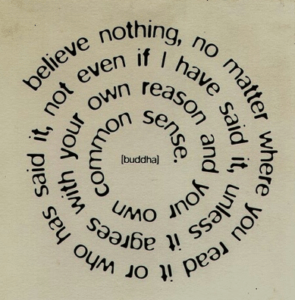Make Common Sense More Common
“Common sense is the simple knack of seeing something the way it really is and doing something the way it should be done.”
—Mark Twain
I am often asked if common sense is a thing you have, or if you don’t can it be taught?

I have always defined common sense as “good decisions made from experience rather than academic work.” With that in mind, over the past 200 years, it is one of the most admired and valued traits in America. It conjures images of early and simpler times when hard-working men and women built our country. In my experience, folks with their share of common sense are usually sensible, down to earth, dependable people.
Based on what I am seeing in the news and on college campuses these days, common sense seems to be doing a fast fade into history. It is, I think, under assault from many directions. Common sense is, for all practical purposes, staggering from an all-out assault. Heck, just consider the political correctness movement. I wonder how many people see political correctness as a near complete abandonment of common sense in contemporary political dialogue.

The champions of “PC” insist that the world let men into women’s bathrooms and that institutions of higher learning (colleges) shelter college students from words, verses in songs, or even opinions that in some way disturb them. While demanding that America bring in tens of thousands of Muslims from the jihadi-infected Middle Eastern nations, the PC orthodoxy tries to ensure that average folk are deprived of the means to defend themselves and their families from those very people.
I wonder how many people see
political correctness as a near complete
abandonment of common sense
in contemporary political dialogue.
So let’s face it; common sense is apparently neither common nor sound- sense related. Most of us would agree that there’s a real lack of sound judgment lately, ergo, it’s not common or makes sense. If common sense were truly common, then you wouldn’t see people doing many of the silly things they do each and every day. When was the last time you saw someone buy a smartphone or flat-screen they really couldn’t afford? How about that fancy car? Don’t even get me on fast food or smoking, and the lottery?

And then there’s politics. Where does Mr. Weiner sit on the common-sense scale? Whether you are a supporter or Mrs. Clinton or President Trump, how many nonsensical things have come out of their mouths in the past 18 months? Indeed, with a healthy dose of common sense, people wouldn’t do the hundreds of things they do that are bad for them…or their family…or community.
Did you know that there is a philosophy of common sense? Yep, I looked it up. It is called “common sense realism.” According to Allen Guelzo, the famous American historian from Gettysburg College, common sense realism at one time “reigned supreme in American higher education.” You can hear it in his lecture series, “The American Mind.” In that series, he makes the image shattering statement, when you compare it to now:
“Before the Civil War, every major [American] collegiate intellectual was a disciple of…common sense realism.”
Did you read the particular words he used? He said “every,” not most, or some, or almost all, he said “every.” According to Robert Curry in his book, The Common Sense Nation, the philosophy of common sense was so important it is was “virtually the official creed of the American Republic.”

So how about we go back the definitions again, since clearly few of us learned this in school. Some of the problem is that we don’t have a very good definition or operating understanding of what common sense is as compared to our forefathers. Try this on for size:
Common sense is a way of making high quality decisions in order to avoid mistakes.
Does that work for most people? Think about it; high quality decisions are based on your experience and those experiences are usually gained through the process of making bad decisions. So when you get right down to it, when it gets really personal, common sense—and the absence of it— has one common starting point…your individual personal experiences.

And no, you didn’t enter the world with it. Your brain has the ability to discover what common sense is, but you didn’t hit the ground with it. Your experiences in life push you in one belief direction or another, even including the thought that common sense can or cannot be taught. It is all in your accumulated experiences. Challenging the status quo in a popular way and the inspired courage to that comes from life’s experiences alone. That may be the core of why common sense isn’t so common. Consider the way we keep children away from harm, young adults from things they fear, college students from ideas that upset them…and on it goes.
And no, you didn’t enter
the world with it. Your brain has the
ability to discover what
common sense is, but you
didn’t hit the ground with it.
I have wondered if there is a better defined list of what we teach people about common sense we might all be more successful in life. So let’s take it back to common sense realism.

Let’s keep things simple here; common sense realism seems to come to us in two forms. The first—the ordinary, everyday type—is the kind we use all day long as we pass through the world. You usually just call it plain old “common sense.” If you think that a boy in a ball gown and high heels and identifies as a girl is still a boy, then you are what the Scottish School of Common Sense would have called a “common sense realist.” Abraham Lincoln spoke for all of us regular common sense folk when he said:
And then there’s the other kind. The philosophical kind. The philosophy of common sense realism. Hamilton, Lincoln, and more were practitioners of this second form of common sense—common sense realism. It was, and remains today, a philosophical approach of great precision and range for those who aspire to common sense.
So when you think about it; common sense isn’t really a sense.
Maybe common sense is better thought of as a way of thinking and using our judgement and in turn, behaving in the world.
If common sense is based on good judgment and judgment comes from our thinking and acting experiences, what are some easy ways to learn more common sense? Below are ten tips for improving common sense.
- Ask Good Questions
Asking questions is a great way to get helpful tips to avoid problems. When you think that your question is stupid, it just cheats you out of the knowledge you need to make a good choice.
- Think Ahead
Consider what you are about to do before you do it, as well as the possible outcomes of the choice you are considering. You might just discover that your attitude has a great deal to do with the outcome. Consider, review, and reconsider until you find a way to reach the result you hope for.
- Benefit from Your Mistakes
It is usually ok to make a mistake as long as you learn from it. My old boss, Austin Warner from Warner Nursery, used to tell me when I was learning to prune trees that a person who doesn’t make mistakes doesn’t make anything at all. He is a wise man.
- Question Your Beliefs
It is your assumptions that you most often need to question. Ayn Rand, in Atlas Shrugged, once wrote, You will find one of them is wrong.” The next time you mess up, take a look at all of your assumptions and take advantage of the next opening differently.
- Watch Other People
Observe how people that you think have loads of common sense think and act. You can learn from them. It isn’t plagiarism to copy their ways of processing information and taking action in their lives. Frankly, if you asked them to explain themselves, they would look at you like you had a second nose. They are too busy using common sense to take the time to discuss it.
- Change Your Methods
Did you ever hear the quote “by the time I figures out ‘where it was at’… they moved it”? There are indeed times when yesterday’s answers won’t work today. It is just the way the world works. If one way fails, try another. There are times to plan and times to execute. If the choices are easy, go ahead and make them quickly. When you find a hard one though, think carefully and make the best choice you can.
- Keep Your Sense of Humor
Have you heard yet that you aren’t leaving this world alive, no matter who you are? Particularly where your own choices are concerned, take time to laugh. Please. There will be times when humor is the only good medicine available. Know that when you take time to laugh, it will make you feel better. So why not?
- Pay Attention to Your Timing
When was the last time you spent too much energy or time getting no results? Remember the 80/20 rule and remember that it is an axiom as much as just a rule. Common sense will tell you to do the little thing that matter first to get the biggest results. My mom used to say, “In life, as in anything, timing is everything.”
- Notice Nature
Some of the smartest and most serene sayings come from nature. There are laws of nature that will help you as well as sabotage your efforts with equal aplomb. One such law is that all things happen for a purpose, and usually it is for our benefit. Another is that we fail in order to learn to succeed, or the one that bites people regularly. Reciprocity. What goes around, comes around. When you take more than you give, something takes it back. Growing a tree takes years; so does common sense.
- Learn How Things and People Work
Knowing what makes people tick so that you can work better with them is a fundamental basis of common sense. Usually it is their desire to think and act independently, to be seen as unique and that drives them. Being able to settle differences in a beneficial way is something that you can learn because people have more in common than you might think. Parts usually work together in systems, machines, or communities. Do you see how communities—as with mechanical systems—take time to learn and appreciate? Learning to accommodate peoples’ desires to think and act on their own is a really smart practical application of common sense.
So in closing I ask you to give the issue of common sense some thought. When you think of what it can be—acting and thinking in ways that guide you to your best outcome with the lowest cost, or harm—you can then start to learn about what common sense really means in each person’s life.
Whether you use the garden variety espoused by Lincoln in his now famous quote (see earlier quote) or the rigorous philosophical type from Thomas Reid (used as a textbook at Harvard in the 19th century), you still need to question assumptions, ask questions, think ahead, grow from your mistakes in both knowledge and depth, watch both people and nature, laugh more, learn how things work, and focus on your timing—really, you do.
If you do all these things…daily…consistently…you just might learn that common sense isn’t something that you have or don’t have, but rather something that you can learn. And aren’t things you learn usually worth having?

Sources:
James Feiser, “A bibliography of Scottish Common Sense Philosophy
G.A. Johnson, “Selections from the Scottish Philosophy of Common Sense, including essays by Thomas Reid
George Boas, “Dominant Themes of Modern Philosophy”
Allen Guelzo, “The American Mind”
Robert Curry, “Common Sense Nation”
Robert Curry, “What Ever Happed to Common Sense”
Ayn Rand, “Atlas Shrugged”

